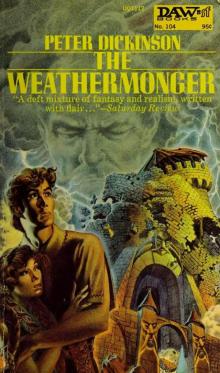The Weathermonger, page 1
part #3 of Changes Series





21-03-2023
Reworking of an earlier conversion
(missing pages resatored)
THE ENIGMATIC
ISLAND
“You must understand that the only phenomenon we have actually been able to observe over England during the last five years has been the weather. Most Western powers—France, America, Russia, Germany—have sent agents in to your island, but very few have returned. Those who did return brought no useful information, except that the island was now fragmented into a series of rural communities, united by a common hostility to machines of any sort, and by a tendency to try to return to the modes of living and thought that characterized the Dark Ages. The agents themselves say that they felt similar urges and were tempted to stay too ...
“So you are doubly interesting to us, Mr. linker. First, because you explain the English weather pattern. And secondly, because you appear to be genuinely immune to the machine phobia which affects anyone who sets foot in England. You seem to be the first convincing case in the twenty million people who have left England.”
THE
WEATHERMONGER
ΙΙΙΙΙΙΙΙΙΙΙΙΙΙΙΙΙΙΙΙΙΙΙΙΙΙΙΙΙΙΙΙΙΙΙΙΙΙΙΙΙΙΙΙΙΙΙΙΙ
Peter Dickinson
DAW BOOKS, INC.
DONALD A. WOLLHEIM, PUBLISHER
1301 Avenue of the Americas New York, N. Y. 10019
Published by
THE NEW AMERICAN LIBRARY
OF CANADA LIMITED
Contents
I THE ISLAND
II THE CHANNEL
III THE GENERAL
IV BACK
V NORTH
VI ROUGH PASSAGE
VII THE STORM
VIII THE TOWER
IX THE SENESCHAL
X THE DIARY
XI THE NECROMANCER
XII PORTENTS
XIII TIDYING UP
Copyright ©, 1968,1969, by Peter Dickinson
A DAW Book, by arrangement with
Little, Brown & Company
All Rights Reserved
Cover art by George Barr
First Printing, May 1974
1 2 3 4 5 6 7 8 9
PRINTED IN CANADA
COVER PRINTED IN U.S.A.
I
THE ISLAND
He woke up suddenly, as if from a deep sleep full of unrecoverable dreams. He was very uncomfortable. The light was too bright, even through closed eyes, and there was something sharp and hard jutting into one of his shoulder blades. His head hurt too.
He moved his right arm in search of something familiar, a sheet or a wall, and found a quite different feeling — hundreds of rough, scratchy lumps on a warm but slimy surface, like iron pimples. Familiar, though — barnacles on a sea rock. He was lying on a rock. He opened his eyes and sat up.
His skull yelped with pain as he did so, and his hand moved instinctively to touch the smooth round thing that should have been hanging round his neck, and wasn’t.
A voice beside him said “They took it away. They hit you on the head and took it away, so that you wouldn’t be able to use it.”
She was a girl, about twelve, a kid with pigtails, very dirty, her face swollen with crying, but wearing what looked like an expensive dress of green brocade with gold trimmings that would have come right down to her ankles if she'd stood up. She was sitting beside him, her knees under her chin. Beyond her the sea lay flat as a Formica tabletop, hard blue, joggling in one patch by a sunken rock just enough to catch a few glints of the vertical noon sun. A perfect day.
“Who took it?” said Geoffrey, not even remembering what “it” was.
“They did.”
Without looking round she jerked her chin over her shoulder and he turned. He was on a tiny rock island, which shouldn’t have been there, in the middle of Weymouth Bay. The pretty dollshouses ranged right and left along the Front above the crowded beach, and George IV’s great gilt statue stood pompous at the far end. The pier was gone though, with only a few tarred and tilted timbers to show where it had been, and the crowd wasn’t a holiday crowd either. They were all standing, shoulder to shoulder, looking out to sea, and all fully dressed. There wasn’t a bathing suit anywhere. As he turned they roared, a long jeering moo. They were looking at him.
“What on earth are they up to?” he said.
“They’re waiting for us to drown. When the tide comes in.”
“Well, don’t let’s wait for them. It’s still quite shallow. Come on.”
“They won’t let you ashore, but they want you to try. That’s what they like. I’ve seen it.”
“Oh, piffle! Come on.”
Without waiting to see whether the girl would follow, Geoffrey hitched up his robes and stepped into the sea. A pleased hum throbbed through the crowd, like the purr of a huge cat. The water was beautifully warm; it must have been a first-rate summer; he couldn’t remember. He sploshed towards the shore, hampered by his silly dressing gown of a robe, worried about spoiling its precious gold fabric with salt water, but comforted by the real, everyday feel of watery sand under his feet. As he waded the front row of the crowd opposite where he stood looped forward into the fringe of the sea. They were all men, rather small men, but carrying what looked like spears. The whole of Weymouth Bay seemed to have shrunk a bit.
Once they had worked out where he was aiming for, the spearmen bunched there in a close line and lowered their spears. They weren’t only small — they were oddly dressed, with a history-book look about them. Most of them had ordinary jackets, very patched, but some were wearing crisscross leggings and others a sort of sacking kilt, and they all had beards. When he was a couple of feet from the spearpoints, which looked dead sharp, he stopped. The crowd was still as an empty beach.
“What on earth do you think you’re doing?’’ he said to the man directly in front of him. “Come off it.”
It felt odd to be talking to a grown-up like that, but they were really behaving a bit daft, and anyway he was quite as big as they were. His voice came out round and firm, without that dratted squeak.
The man (he was bald, with a coppery beard, his face tanned dark as a gypsy’s, with a mesh of tiny crimson veins running under the tan on his bulgy nose) said nothing, but the line of spearmen moved another pace into the water, and the man’s spear touched Geoffrey’s robe, pierced it, pricked his skin. Quite right, the points were sharp, so it hardly hurt at all. Geoffrey stood his ground.
With a happy grin the man prodded the steel a quick half inch further in and twisted. That hurt like mad. Geoffrey forgot his robe and the water and tried to jump back, but tripped and sat down in the clammy wetness. The crowd bayed and cheered. Geoffrey scrambled up from his defenseless sprawling, but the man made no further attack. He just stood, watching and grinning. Geoffrey looked down at the gold robe, where the blood was beginning to make its own pattern among the threads; he felt the tears of pain and defeat in his eyes, and (so that the crowd on the beach shouldn’t see them) turned and waded back to the tiny rock island that shouldn’t have been there.
As he was climbing on to it, he saw that it was really a platform made of broken slabs of concrete roughly heaped together — a platform for drowning people from. The girl had been crying again, but had stopped.
“I told you so,” she said. She sounded not smug but sympathetic and miserable. Geoffrey stared at her, wondering who she was and what the people on the beach could be up to, trying to drown a couple of kids. He felt again at his chest, where the round, smooth whatever-it-was should have been, dangling from its gold chain.
“They took it away,” she said. “I told you. Can’t you remember anythingV*
“Not much.”
“Don’t you even know who I am?”
“I’m afraid not.”
She started to snivel again.
“I'm Sally,” she said between gulpings, “your sister Sally.”
Oh, Lord! Geoffrey sat down on the concrete and stared out to sea. The water had only a couple of inches to come and it would cover their island. And somewhere he’d lost five years. No wonder the Bay was smaller and people were smaller. But why had they all gone mad? He’d have to do something for Sally now, anyway, even if she was a different Sally and not the cocky six-year-old clown he knew.
“Why do they want to drown us?”
“For witches. They came to ask you about making weather and found you putting a bit of machinery from the boat into the oven. Then they banged you on the head and took your talisman away, and then they rummaged round the house and found my pictures, so they rang the church bells and brought us down here to drown.”
“Making weather?”
“Yes. You did it with your talisman. You’re the weathermonger in Weymouth. Every town has one. I think that’s really why they want to drown you, because you’re one of the richest men in Weymouth and they want your money. They paid you pounds and pounds for a good harvest.”
“But Quern's still there?”
“Oh, yes, that’s where the bit of engine came from which told them you were a witch. You sneak down and fiddle with her almost every week. I’ve seen you out of my bedroom window, though what use she is without sails I don’t know.”
“What would happen if we tried to swim round to her?”
“They’d run along and get into boats and prod you in the water. We saw a man try it last Whitsun. I laughed and laughed. Oh dear.”
She started off on her gulping again. Geoffrey stared glumly at the rising water. Only half an inch t
“Look,” he said, “I think our best bet’s to wait until the tide’s right in and try and float round with our noses just out of the water and perhaps they’ll think we’ve drowned.”
“But I can’t swim. I’m not a witch. I’ve never touched an engine since the Changes came. I only drew pictures.”
Blast. Geoffrey thought he might possibly be able to swim round to the harbor undetected. It’s surprising how little you can see from the shore of something that’s barely moving and barely projecting from the water. But he couldn’t do it if he had to lifesave Sally all the way.
“Fat chance of our getting it this weather,” he said, “but what we want is a good old sea fog.”
A breathing out of the water. No wind that you could feel, and nothing you could see, if you looked at any particular patch of sea. But all along the coast, from Bournemouth to Exeter, the water breathing up and being condensed into a million million million droplets in the cold layers of air above the oily surface. Cold out of the lower deeps. An unnumber-able army of drops, which even the almighty sun could not feel through, breeding more layers of cold in which more armies of drops could be breathed out. And now the wind you could not feel, pushing the fog from the South, piling it up in heavy swathes against the seaward hills, thick, gray, cold. Thicker. Grayer. Colder. Thicker. Grayer. Thicker . . .
Sally was shaking him by the shoulder. He was sitting in six inches of water and could see about a yard through the grayness. There were shoutings from the shore, a noise of contradictory orders being given in many voices.
“I think they’re getting boats and coming to throw us in,” said Sally. “You could swim now. It didn’t matter their taking it away after all. D'you think you can take me with you?”
Geoffrey stood up and took off his sopping robe. He folded the expensive cloth carefully and tied it in a roll with the belt, with a loop which he put round his neck so that the roll lay on his chest, where the whatever-it-was should have been. He stepped down into the deep water, on the far side of the island. It came up to his neck.
“I don't know if we’ll be able to find our way in this,” he whispered, “but it’s better than being drowned a-purpose, like a kitten. You lie on your back and I’ll hold you under your arms and pull you round. Take off your dress, though, and do it like my robe. Fine. Good girl. Off we go. Try to breathe so you’ve got as much air as possible in your lungs all the time. It helps you float. And pinch my leg if you hear anything that sounds like a boat.”
There was no trouble finding the way in the fog. It was his fog, after all—he’d made it and knew, if he cared to think about it, how its tentacles reached up into the chalk valleys behind the town and its heart drifted in slow swirls above the obliterated beach. But he thought about it as little as he could, for fear of getting lost in it, mind-lost, again. He lay on his back and gave slow, rhythmic frog kicks out to sea. He hoped it wouldn’t be too smelly when they went through the patch by the outflow from the town sewer, where the best mackerel always were. Sally lay very still, like a girl already drowned.
He was beginning to worry about her, to think of risking a few words, when he felt her hand moving over his shin. She pinched him hard and he stopped kicking, slowing to a barely moving paddle. She was right. There was a squeaking of wood on wood in the grayness, between them and the beach, and it was coming nearer. A voice said “What’s that, over there?” Pause. More squeaking. Another voice said “Lump o’ timber. This is right useless. Let’s be goin' in. Who’d have thought the young wickeder would have had another talisman?” Another voice said “We’ll be lucky if Dorset sees a morsel of dry hay this summer. Never cross a weathermonger, I always say. And he was a good un, for a young un.” “He was an evil witch,” said a more educated voice, fiercely. “Thou shalt not suffer a witch to live.” The voices wrangled away into silence.
Geoffrey kicked on. He seemed to have been doing it for hours, and his legs were flabby after their rest. He began to count kicks, in order to keep going. Seven, eight, nine, eighty, one, two, three, four . . . the water was greasy with electricity under the grayness. They disturbed a gull which rose effortlessly from the surface and vanished. There didn’t seem to be any smell where the sewer came out — perhaps they weren’t using it any more . . . eight, nine, six hundred, one, two . . . , nine, a thousand, one, two . . . round the corner and into the straight. Not all that far now. There was the heeling black side of the old Jersey ferry. Lord, she was rusty. Ouch!
He’d banged his head against something — a dinghy. The varnished planks seemed like a welcome home to a world he knew, after all that wet and grayness.
“Hang on here,” he whispered, showing Sally where to clutch the gunwale. “Don’t try to climb in.”
He worked his way round to the stern, gave a final kick and heaved himself over, barking his belly a little. His legs felt empty and boneless, like one of those toy animals with zippers that women keep nighties in. Or used to, anyway. Heavens knows what they did now. He had a struggle getting Sally in — she was near the end of her strength — but managed it with a lot more noisy splashing than he cared for. There weren’t any oars in the dinghy, of course, but at least he could paddle with the footboard. He moved to the bows and hauled on the painter until a blue stern solidified in the fog.Sche-hallion IV it said — Major Arkville’s boat. Well, he wouldn’t mind lending his dinghy.
“Where’s Quern? he whispered.
“Further down on the other quay, but it’s no use going there. You want a boat withsails, Jeff. This one would do. You could always make a wind.”
“I’d rather have an engine.”
“But you haven’t got the stuff. They burnt it all, every drop they could find. I saw it. There was a great big poof noise, and fire everywhere. The poor old Mayor got roasted, because he stood too near.”
Geoffrey felt obstinate. She was probably right, providing he could make a wind (but in that case who’d steer, supposing he “went under” like when he made the fog, if he hadmade it? And anyway, if he could sail so could they — faster, probably, and the wind would blow the fog away.). But he wanted to see Quern again, if only for Uncle Jacob’s sake. He didn’t want to ask Sally about Uncle Jacob, because he knew something must have happened to him. There’d have been no question of drowning kids if Uncle Jacob had been about. He paddled clumsily away from the blue stern.
Quern was tucked right in under the quay, with a line of sailing boats lashed outside her. He tied the dinghy to the outermost and crept across the decks. The ones nearer the quay were in a very lubberly condition, but Quern herself seemed OK. Somebody (himself, Sally said) had been looking after her. Let’s hope he’d been looking after the engine too. He lifted the hatch.
The engine was speckless, but the tank was quite empty. Geoffrey ducked into the cabin and crawled through the hatch in the forward bulkhead to where Uncle Jacob kept the spare cans (“As far from the engine as possible, laddie. Fire at sea is a terrible thing. I’ve seen it.”). There were three big jerricans, all full, which had evidently been missed at the time of the Mayor-roasting. He lugged one back and rummaged for dry clothes in the port locker. Two oily jerseys, two pairs of jeans — terrific.
Sally was peering down into the engine hatch, shivering.
“It’s like one of my pictures,” she said.
“You’d better get into these.”
“But they’ll beat me if they find me wearing trousers. It isn’t womanly!’
“If they find you they’ll . . . ach, never mind. But I can’t remember whether it’s womanly or not, and no one else will see you. Off you go, and I’ll try and get this thing running.”
She crept into the cabin, and Geoffrey bent to the engine. He filled the tank, turned the petrol switch, closed the choke, flooded the carburetor and swung the handle. It wasn’t as stiff as he expected, which meant that he must have been turning it over from time to time. He swung again. Nothing. And again. And again. Nothing. He looked at the filter glass under the carburetor and found it was full of water — of course. There’d have been quite a bit of condensation in the tank. He unscrewed the glass and let the petrol flow for a little into the bilge. As he was preparing to swing again he realized that the magnetocover was loose, and lifted it off. No magneto. No hope then. Wait a sec, though; there might be a spare. Uncle Jacob was a maniac for spares, always taking up good locker space with things he’d be unlucky to need once in a lifetime. His cronies had said that he sailed about with a complete spare ship on board.

























